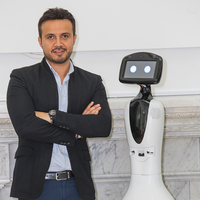Machines that truly understand language
would be incredibly useful and natural language processing (NLP) is making this
possible. NLP algorithms are typically based on machine learning algorithms,
which process, analyze, and act on vast amounts of data. However, deep
learning-based NLP still suffers from serious shortcomings including poor
interpretability (the degree to which humans can understand), inferior scalability, and reduced robustness.
To address the challenges of semantic gaps
and data sparsity in large-scale NLP, Zhiyuan Liu, an Associate Professor from
the Department of Computer Science at Tsinghua University, has explored
representation learning methods for multiple units of natural language, including words, phrases, sentences, documents, networks and knowledge. He has built
implicit representations with low-dimensional embedding vectors and knowledge
representation with structured knowledge graphs. By taking advantage of
information fusion of implicit representation and inference power of knowledge
representation, he built a unified representation framework that bridges the gaps
in data-driven deep learning and symbol-based linguistics, as well as world
knowledge. This framework can support knowledge-guided NLP and is especially
important for those knowledge-rich tasks such as reading comprehension,
question answering, and text generation.
Liu has accomplished a number of innovative
achievements and published several academic papers in leading AI and NLP
conferences and journals. Moreover, he has released many popular open source
packages for NLP, such as the Chinese lexical analyzer THULAC, the knowledge
representation learning package OpenKE, and the network representation learning
package OpenNE, which have attracted more than 10 thousand stars on GitHub and
are used by hundreds of institutions and companies.
Liu believes that there is great potential for
NLP development in China, but there are still too few researchers who devote
themselves to natural language processing. As a doctoral advisor in the NLP
field, he wants to help talented young students develop an academic and
professional interest in the area. “Natural language processing is key to the
realization of artificial intelligence. Human language is also full of unknowns.
I hope more young students can join in and we can explore it together,” he
said.




